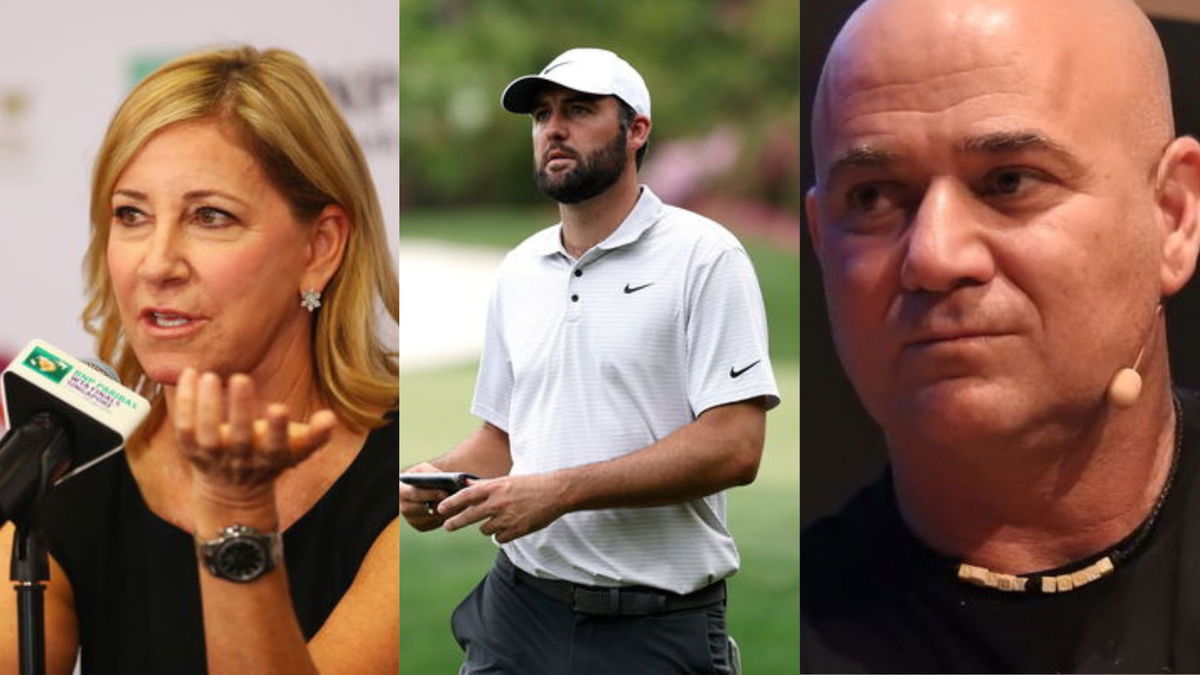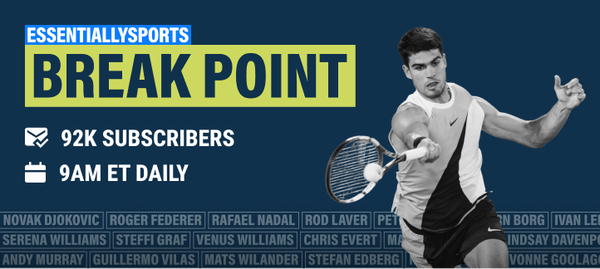
Getty
Chris Evert (Photo by Clive Brunskill/Getty Images), Scottie Scheffler (Photo by Richard Heathcote/Getty Images) Andre Agassi ((Photo by Europa Press Entertainment/Europa Press via Getty Images)

Getty
Chris Evert (Photo by Clive Brunskill/Getty Images), Scottie Scheffler (Photo by Richard Heathcote/Getty Images) Andre Agassi ((Photo by Europa Press Entertainment/Europa Press via Getty Images)
At 29, Scottie Scheffler is the kind of athlete others dream of becoming. He’s won three major championships, held the world No. 1 ranking since 2023, and enters this week’s Open Championship as the odds-on favorite. But on Tuesday at Portrush, the American paused to ask a question no trophy could answer: what is the point of it all? And his recent revelation has the support of various tennis stars like Chris Evert and Andre Agassi.
Watch What’s Trending Now!
During an unusually introspective press conference, Scheffler didn’t talk about strategy or swing mechanics. Instead, he looked inward and then outward, offering a raw glimpse into the emotional paradox of athletic greatness. He said, “That’s something that I wrestle with on a daily basis. Showing up at the Masters every year, it’s like, why do I want to win this golf tournament so badly? Why do I want to win the Open Championship so badly? I don’t know. Because, if I win, it’s going to be awesome for two minutes.” He continued, “I’m not out here to inspire someone to be the best player in the world, because what’s the point? This is not a fulfilling life. It’s fulfilling from the sense of accomplishment, but it’s not fulfilling from a sense of the deepest places of your heart.”
ADVERTISEMENT
The confession landed with force, even beyond the world of golf. Andre Agassi, no stranger to the disillusionment of winning, was quick to respond. The 8-time Grand Slam champion posted on Instagram, “Know exactly how you feel. Reach out anytime. Appreciate you.”
View this post on Instagram
ADVERTISEMENT
Chris Evert, the 18-time major winner, weighed in on X. “👍👍👍insightful and honest!” she wrote.
Andre Agassi, once laid bare the shadows that trail even the most successful careers. “I play tennis for a living even though I hate tennis, hate it with a dark and secret passion and always have,” Agassi wrote in his searing 2009 autobiography Open. A line that stunned fans when it was first published. For those at the top, the grind rarely comes with grace. Fame, fortune, and silverware do little to quiet the pressure. In fact, it’s often the champions, those with the most to lose, who carry the heaviest burden. He further illustrated his point and wrote, “I know this for myself – it’s something you’ve done since you were six years old, and there’s a sense that if you stop giving 100% you are doomed to failure, and that is unacceptable. No wonder so many players hate their sport – the surprise is that so few admit it.”
ADVERTISEMENT
Over the past few years, tennis has become one of the most open arenas for discussing mental health.
ADVERTISEMENT
Tennis players open up on the mental toll of the sport
Scheffler’s existential reckoning arrives at a time when more athletes are publicly confronting the mental toll of elite sport.
Naomi Osaka made headlines in 2021 when she pulled out of the French Open and later admitted she had been battling depression and anxiety. The 4-time Grand Slam champion then took a hiatus from the sport to deal with her mental health. At the time, it sparked a global conversation. Looking back, Osaka said she was glad she made that decision and said, “I felt like I needed to step back and take time for myself.”
ADVERTISEMENT
Andrey Rublev has also peeled back the curtain on his inner turmoil. Once known for his on-court outbursts and self-inflicted punishment, Rublev has spoken candidly about his struggles with depression and the weight of expectation. However, after working with a psychologist and actively working on his mental health, he has a new outlook.“If I win a slam, would it change my life or compensate? For sure, not,” he said. “It will only give me good relief that, yes, I was doing this since I was a kid and I was able to win one of the most important events. It will not make me more or less happier. Before I felt it would change my life – but it will not change it at all.”
Even Alexander Zverev, now World No.3, has spoken candidly about his mental health. After his recent exit from Wimbledon, the German star opened up about deeper struggles off the court. Despite reaching three Grand Slam finals and maintaining a top-tier ranking, he admitted, “I feel very alone out there at times. I struggle mentally. … I’m trying to find ways to kind of get out of this hole. I keep kind of finding myself back in it in a way.”
ADVERTISEMENT
For all the trophies and titles, the pressure to constantly perform and the isolation that often comes with it is a reality many champions quietly carry. And in speaking out, Scheffler joins a growing chorus of athletes willing to admit that greatness, for all its glory, can still feel hollow when the person behind it is struggling to feel whole.
ADVERTISEMENT
ADVERTISEMENT
ADVERTISEMENT
